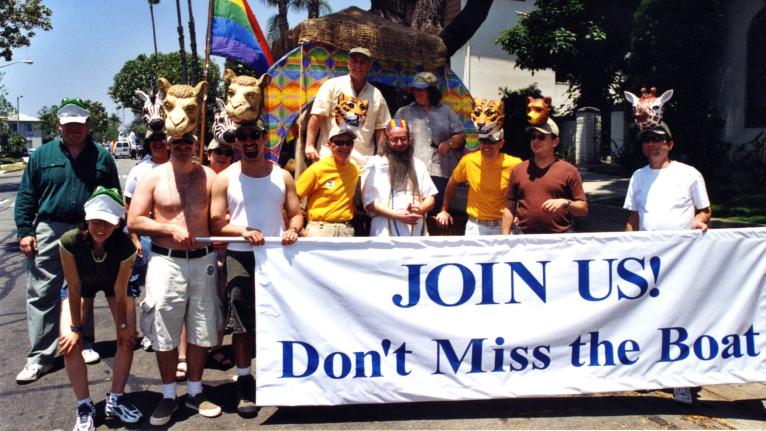The California State Library recently awarded a grant to ONE Archives at the USC Libraries and L.A. as Subject to increase the visibility of archives and historical collections highlighting a diversity of LGBTQ+ experiences and human rights activism in California.
As part of a two-year project, ONE Archives will process 19 historical collections including the records of the Center for Health Justice, the Gay Men’s Chorus, and the Long Beach/Orange County Motorcycle Club as well as the papers of activists like BLK Magazine creator Alan Bell, Lee Mentley, Pat Rocco, founding ACT UP Women’s Caucus member Judy Sisneros, and Project 10 founder Virginia Uribe.
Working collaboratively with archives in the L.A. as Subject research alliance, which is hosted by the USC Libraries, project team members Beth McDonald, Liza Posas, and Loni Shibuyama will gather information about less-visible LGBTQ+ collections in archives throughout Southern California. In the next months, the project team will be conducting outreach to L.A.-area archives, completing site visits, and documenting a wealth of primary materials on California LGBTQ+ experiences.
Many archives are home to collections that include important LGBTQ+-related content that has not been described so it can be easily found by historians, media producers, journalists, teachers, and everyone with a stake in understanding LGBTQ+ issues and experiences—and the complex, changing expressions of gender and sexuality in the California past.
“We believe there is a wealth of materials out there that are hidden in plain sight or that have content where the LGBTQ connections might not be obvious, especially during historical periods before words such as ‘transgender’ were even used,” said Loni Shibuyama of ONE Archives.
“Perhaps there’s correspondence between two servicemen expressing their affection for one another, or perhaps there are materials from a local restaurant or bar that was also a popular hangout for LGBTQ people,” she added. “We hope to bring some of those stories to the surface and really highlight the diversity of LGBTQ experiences.”
“I’m definitely expecting some surprises,” said archivist Beth McDonald. “Photographs and letters that reveal unknown connections, ephemera like flyers or bar coasters from hangouts in areas where we know there was an active LGBTQ community . . . I think a lot of repositories have collections with LGBTQ materials and they just don’t realize it.”
The 267 members of the L.A. as Subject research alliance are an especially promising trove of less-visible LGBTQ+ collections and primary source materials, said L.A. as Subject coordinator Liza Posas. “I look forward to the hidden LGBTQ+ materials we’ll find within our member archives’ holdings through this collaborative project,” she added.
Accordingly, the project team will focus its efforts on a survey of L.A. as Subject archives and historical collections to identify previously less-visible materials. McDonald will add information about LGBTQ+ collections to the L.A. as Subject online directory, and the team will create online exhibitions and other resources using the Scalar platform for digital scholarship.
Southern California archives with LGBTQ+ materials should contact McDonald for inclusion in the L.A. as Subject directory and other resources created through the project.
We will share further updates as new online finding aids are created for the 19 historical collections at ONE Archives and new online resources are developed for California LGBTQ+ histories in the holdings of L.A.-area archives.
This project to preserve and make accessible California’s LGBTQ+ history is supported by funding by the State of California, administered by the California State Library.
